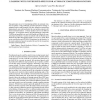1291 search results - page 15 / 259 » Learning a language model from continuous speech |
ICASSP
2011
IEEE
14 years 5 months ago
2011
IEEE
We propose to improve speech recognition performance on speaker-independent, mixed language speech by asymmetric acoustic modeling. Mixed language is either inter-sentential code ...
135
click to vote
ICASSP
2010
IEEE
15 years 2 months ago
2010
IEEE
Data sparseness is an ever dominating problem in automatic emotion recognition. Using artificially generated speech for training or adapting models could potentially ease this: t...
142
click to vote
EMNLP
2011
14 years 1 months ago
2011
Conversations provide rich opportunities for interactive, continuous learning. When something goes wrong, a system can ask for clarification, rewording, or otherwise redirect the...
CSL
2007
Springer
15 years 1 months ago
2007
Springer
Humans are able to recognise a word before its acoustic realisation is complete. This in contrast to conventional automatic speech recognition (ASR) systems, which compute the lik...
104
Voted
JALC
2007
15 years 1 months ago
2007
Inspired by the results obtained in the string case, we present in this paper the extension of the correction queries to regular tree languages. Relying on Angluin’s and Sakakib...

